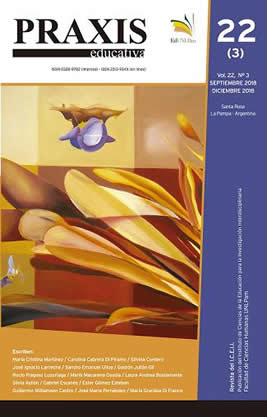The anthropological lens as part of the training of health professionals. Experiences and reflections
DOI:
https://doi.org/10.19137/praxiseducativa-2018-220304Keywords:
anthropology, occupational therapy, University, health, autoethnographyAbstract
The anthropological discipline, and particularly the density of the ethnographic
method, consititute essential conceptual tools in the training of diverse humanistic bachelor’s degrees as well as the ones related to the health field. Specifically, in this last area the anthropological perspective is not usually included among the highly
valued knowledge implemented by health agents who are used to trusting more, for instance, in “medical science”. In this text, a pedagogic experience of teaching anthropology applied to health field is described, considering the implementation of an elective seminar for advanced students in an Occupational Therapy bachelor’s
degree. In an auto ethnographic key, the impact of this training is analysed taking into account that, despite being considered “holistic” in its conception of health and human being, Occupational Therapy is highly attached to biomedical knowledge and practices.
Downloads
References
Algado, S. (2016). “Terapia ocupacional, cultura y diversidad”.En: Cadernos Brasileiros de Terapia Ocupacional. 24 (1): 9 páginas. Disponible en: http://dx.doi.org/10.4322/0104-4931.ctoRE0677.
Alonso, J. y R Aisengart Menezes (2012). “Variaciones sobre el «buen morir»: un análisis comparativo de las gestión del final de la vida en cuidados paliativos en Argentina y Brasil”. En Intersecciones en Antropología,13 (2): 461-472.
Beaudry Bellefeuille, I. (2013). “El enfoque de la integración sensorial de la doctora Ayres”. En Revista electrónica de terapia ocupacional Galicia, TOG, 10 (17): 11 páginas. Disponible en http://www.revistatog.com/num17/pdfs/historia1.pdf
Becker, H. (2009). Trucos del oficio. Cómo conducir suinvestigación en ciencias sociales. Buenos Aires: Siglo XXI.
Becher, T. (2001). Tribus y territorios académicos. La indagación intelectual y las culturas de las disciplinas. Gedisa: Barcelona.
Bourdieu, P. (2008). Homo academicus. Buenos Aires: Siglo XXI.
Cortés, B. (1997). “Experiencia de enfermedad y narración: el malentendido de la cura”. En Nueva Antropología, XVI (53): 89-115.
Fassin, D. (1996). L’espace politique de la santé. Paris: Presses Universitaires de France.
Fleischer, S. (2006). “Pasando por comadrona, midwife y médico: el itinerario terapéutico de una embarazada en Guatemala”. En Anthropologica, XXIV: 51-75.
Good, B. (2003). Medicina, racionalidad y experiencia. Una perspectiva antropológica. Barcelona: Bellaterra.
Iwama, M.; Simó Algado, S. y M. Kapanadze (2008). “Michael Iwama: En busca de una Terapia Ocupacional culturalmente relevante”. En Revista electrónica de terapia ocupacional Galicia, TOG, 5 (2): 29 páginas. Disponible en: http://www.revistatog.com/ num8/pdfs/maestros.pdf.
Kleinman, A. (1980). Patients and Healers in the Context of Culture. Berkeley: University of California Press.
Knorr-Cetina, K. (2005). La fabricación del conocimiento. Buenos Aires: Universidad Nacional de Quilmes Editorial.
Lakoff, A. (2003). “Las ansiedades de la globalización: venta de antidepresivos y crisis económica en la Argentina”. En Cuadernos de Antropología Social, 18: 35-66.
Parra, E. (2015). “Análisis del concepto ‘justicia’ en terapia ocupacional”. En Revista de la Facultad de Medicina, 63(3): 8 páginas. Disponible en: http://dx.doi. org/10.15446/revfacmed.v63n3.49629.
Perdiguero, E. y J. Comelles (eds) (2000). Medicina y Cultura. Estudios entre la antropología y la medicina.Barcelona: Bellaterra.
Sheper Hughes, N.(1990). “Three Propositions for a Critically Applied Medical Anthropology”. En Social Science & Medicine, 30(2): 189-197.
Van Gennep, A. (2006). Los semisabios. Buenos Aires: Eudeba
Downloads
Published
Issue
Section
License
Copyright Notice
Editorial Committee Educational Praxis Magazine:
I hereby declare that I am the author of the article titled (article name), that it is original and my own and that it was not previously published in any other format or medium. I declare to know that the magazine will not charge me any type of fee under any circumstances, nor will I receive any type of monetary compensation If it were accepted for publication in Educational Praxis, I authorize the aforementioned magazine to publish it digitally and to advertise it on its social networks.
If the work is published, I adhere to the Creative Commons license called "Attribution - Non-Commercial Share Alike CC BY-NC-SA", through which it is allowed to copy, reproduce, distribute, publicly communicate the work and generate derivative works, as long as when the original author is cited and acknowledged. This license has been used since September 2018. In 2016 CC BY NC ND 4.0 was adhered to; and in the years 2017 and 2018 (January-August) CC BY NC 4.0.
This CC BY-NC-SA Share Alike license does not, however, permit commercial use of the work. As an author, the journal may establish additional agreements for the non-exclusive distribution of the version of the work published in the journal, it allows me to self-archive the published articles, in their post-print version, in institutional, thematic repositories, personal web pages or any other relevant use. with the recognition of having been first published in this journal.
Educational Praxis adheres to DORA (Declaration on Research Assessment) signed in San Francisco, California, on December 16, 2012, and to the Declaration of Mexico (Joint Declaration LATINDEX - REDALYC - CLACSO - IBICT).















_(1)2.png)


3.png)











_(2).png)






2.jpg)









